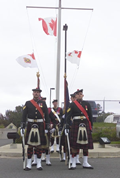Careers With 2nd Bn Nova Scotia Highlanders (Cape Breton)

Officer
Infantry Officer
 The Infantry represents the keystone of any army. Today's Infantry requires officers who are mentally agile and physically robust. You should be aware that training in the Infantry is meant to physically and mentally prepare officers to lead soldiers in critical and life-threatening situations. This requires highly motivated individuals who are prepared, in support of an operational mission, to put the safety and well being of their soldiers ahead of their own.
The Infantry represents the keystone of any army. Today's Infantry requires officers who are mentally agile and physically robust. You should be aware that training in the Infantry is meant to physically and mentally prepare officers to lead soldiers in critical and life-threatening situations. This requires highly motivated individuals who are prepared, in support of an operational mission, to put the safety and well being of their soldiers ahead of their own.
As an Infantry Officer, with the support of your senior non-commissioned members, you will be responsible for the training, combat efficiency, discipline, morale, physical condition and well being of the soldiers under your command, often under the most difficult of circumstances. You will also be responsible for equipment and weapons, including the LAV III combat vehicle. Since the Infantry does not fight alone, you must also know the characteristics, tactics and employment of the other arms who will support you on the modern battlefield, including armour, artillery, field engineers, helicopters and close support aircraft.

Non- Commissioned
Recruit Training CadreRecruiting Officer
563-7100 ext. 7254
Infantry Soldier
 The Infantry is the backbone of any fighting force. Its role is to “close with and destroy the enemy”. Trained to fight as combat troops, Infantry soldiers are capable of performing in special operations, such as airmobile, amphibious and environmental operations, including those in the Arctic and in mountain, jungle and desert areas.
The Infantry is the backbone of any fighting force. Its role is to “close with and destroy the enemy”. Trained to fight as combat troops, Infantry soldiers are capable of performing in special operations, such as airmobile, amphibious and environmental operations, including those in the Arctic and in mountain, jungle and desert areas.
Infantry soldiers must be dependable and self-disciplined. They must be able to react quickly, and adapt readily to changing situations. Courage, physical and mental stamina and positive attitude are essential attributes. The ability and willingness to learn new skills and techniques is also necessary, as the diverse nature of infantry operations requires the development of many specialized skills. Leadership and people management abilities are very important and the ability to work well as part of a team is essential.
Infantry soldiers are trained to:
- Use weapons such as rifle and pistol
- Use explosives and pyrotechnics
- Use mortars, machine-guns, anti-tank weapons, missiles and grenades
- Use communication, navigation and riot control equipment
- Inspect and maintain weapon systems, vehicles and equipment (e.g., clothing, survival gear and personal equipment)
- Participate in airborne operations
- Operate with support elements such as fighter aircraft, helicopters, and artillery
- Engage in unarmed combat
- fieldcraft and battle procedures including camouflage and concealment, internal security, patrols, and escape and evasion tactics